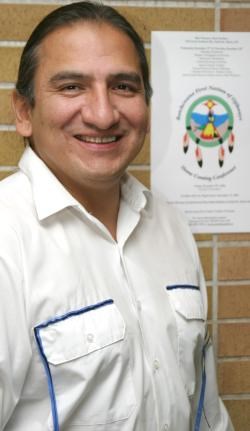NEWS RELEASE
BATCHEWANA FIRST NATION OF OJIBWAYS
***************************** Batchewana First Nation moves HST resolution at national forum
This week, the Assembly of First Nations is hosting their annual assembly where Chiefs meet to set national policy and direction through resolutions.
Chief Dean Sayers of Batchewana First Nation brought the issue of HST to the table and moved the following resolution.
Title: Imposition of Harmonized Sales Tax (HST) on First Nations
Subject: Jurisdiction/ taxation
Moved by: Chief Dean Sayers, Batchewana First Nation, Ontario
Seconded by: Chief Keith Matthew, Simpcw First Nation, British Columbia
Whereas:
A. First Nations affirm our rights as Indigenous Peoples to be involved in all decisions regarding our Aboriginal Title, lands and resources.
B. Given our proprietary and inherent rights to our respective territories, lands and resources, First Nations have a right to be involved in the development of policies and decisions that impact our communities, lands and resources.
C. The United Nations Declaration on the Rights of Indigenous Peoples provides in Article 18 that Indigenous peoples have the right to participate in decision-making in matters which would affect their rights, and in Article 19 that States shall consult and cooperate in good faith with the Indigenous peoples concerned through their own representative institutions in order to obtain their free, prior and informed consent before adopting and implementing legislative or administrative measures that may affect them.
D. First Nations’ treaty relationship is based on the spirit and intent of our treaties and is reflected in the Treaty of Niagara 1764, the two-row wampum and other treaty agreements First Nations signed with the Crown based on a nation-to-nation relationship.
E. First Nations Aboriginal and Treaty rights are reflected in the Royal Proclamation, 1763 and are also recognized and affirmed in the Canadian Constitution Act, 1982.
F. Canada and Provincial governments continue to exploit First Nation resources without compensation or consideration given to First Nations.
G. Canada signed, with both Ontario and British Columbia, Memorandums of Agreement to harmonize the eight percent Provincial Sales Tax (PST) with the five percent Goods and Services Tax (GST) into a combined 13 percent Harmonized Sales Tax (HST).
H. On November 16, 2009 Ontario tabled legislation on implementing the 13 percent HST for July 1, 2010.
I. The proposed 13 percent HST will be administered by the Canada Revenue Agency and current Point of Sale exemptions Ontario First Nations receive on PST will be eliminated.
J. The Supreme Court of Canada has clearly stated in Haida that the Crown owes a duty of consultation to a First Nation when the Crown contemplates conduct that might adversely affect rights or title claimed by the First Nation.
K. The provincial government of British Columbia announced its intentions on September 1, 2009 to adopt the proposed Harmonized Sales Tax (‘HST’) which combines British Columbia’s seven percent provincial sales tax (PST) with the five percent federal Goods and Services Tax (GST), and would be applied to the same tax base as GST is currently applied to.
L. On July 22, 2009 the provincial government of British Columbia signed a Memorandum of Agreement (MOA) with the Government of Canada concerning a Canada-British Columbia Comprehensive Integrated Tax Co-ordination Agreement (CITCA); and according to the MOA, Canada and British Columbia will use their best efforts to enter into the CITCA on or before September 30, 2009 and subject to both parties signing and subject to legislative approval, the implementation date for HST will be July 1, 2010.
M. Canada and both provincial governments failed to meet legal obligations to consult and accommodate and seek First Nation consent on the HST, which will have an immediate negative impact on Ontario First Nation citizens and businesses.
N. First Nations have never agreed to an imposition of taxation on its citizens and another government cannot unilaterally tax First Nations without derogating Aboriginal and Treaty rights.
O. First Nations tax immunity is derived from its nation-to-nation relationship with the Crown and Canada administers First Nation exemptions through an oppressive policy called the Indian Act.
P. First Nations recognize that the Government of Canada imposed the Indian Act on First Nations beginning in 1876, but the Indian Act was never agreed to in any treaty with First Nations.
Q. First Nations opposed the GST at the time it was implemented and hereby oppose any additional taxes that are administered in the same manner as the GST, including the impending HST.
R. The administration of the GST fails to recognize First Nations’ Aboriginal and Treaty rights beyond the boundaries of First Nation reservations.
S. First Nations with no land base, but recognized under the Indian Act as First Nations, will not receive any exemptions from the impending HST.
T. The proposed HST is another example that Canada continues to be an oppressive state against the most marginalized and impoverished people in the country.
U. Given that exploitative industries such as mining and forestry will benefit through financial savings from the proposed HST, First Nations should also benefit as these developments often occur on First Nations lands.
V. Many current British Columbia PST exemptions to environmentally sustainable goods and services will not be continued under HST, but instead will be subject to the full 12 percent HST, and this shift in policy signifies a step away from provincial commitments to environmental preservation and sustainability.
To continue reading this story, please click here
